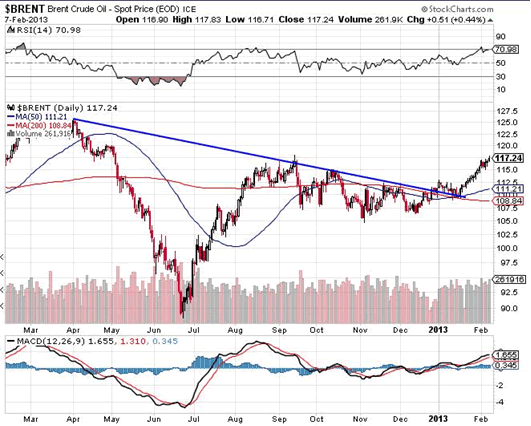Are You Picking the Right Stock for Higher Oil Prices?
Companies / Oil Companies Feb 12, 2013 - 07:01 PM GMT Sasha Cekerevac writes: One of the most difficult aspects of investing is adjusting one’s economic forecast to the dynamic and ever-changing global economic environment. An investor cannot be so dogmatic that they are unable to shift their economic forecast as new data come out.
Sasha Cekerevac writes: One of the most difficult aspects of investing is adjusting one’s economic forecast to the dynamic and ever-changing global economic environment. An investor cannot be so dogmatic that they are unable to shift their economic forecast as new data come out.
For much of the second half of last year, there were many fears that China was going to encounter a significant slowdown, and many analysts had been lowering their economic forecast for that nation. Recent data, however, show that perhaps the Chinese economy might be able to rebound, at least in the short term.
China recently reported that exports grew a better-than-expected 25.0% and imports rose a substantial 28.8% from the year-ago period in January. This was in addition to much higher credit issuance, and an inflation rate that was quite subdued at only two percent. (Source: “China trade tops forecasts in holiday distorted month,” Bloomberg BusinessWeek, February 8, 2013.)
There are some issues with the data: the 2012 Chinese New Year began on January 23 and, in 2013, the Chinese New Year began on February 10; this shift in holidays, which result in business closures, needs to be taken into account when making year-over-year comparisons. However, analysts calculating their economic forecast did take this into consideration, predicting exports of 17.5% and imports of 23.5%, according to the median estimates taken by Bloomberg News. (Source: Ibid.)
If the Chinese economy continues to outperform, not only will analysts increase their economic forecast for the remainder of the year, but certain sectors will also benefit, including oil prices.
International oil prices are set based on Brent crude, as opposed to American-produced West Texas Intermediate (WTI). American oil prices traded at a significant difference to international prices (now over $20.00 cheaper), because most of our oil is landlocked, due to a lack of pipeline capacity.
China imported a net 24.8 million tons of oil, the most since May 2012. This significant increase in demand has led to higher international oil prices and an adjustment for many analysts in their economic forecast for both the energy commodities and the Chinese economy.

Chart courtesy of www.StockCharts.com
There were early indications that adjustments would need to be made to an economic forecast, as oil prices broke a long-standing downtrend in late December. Oil prices then bounced upward off their 200-day moving average (MA) and have extended into a significant increase.
If the economic forecast for the Chinese economy, in addition to other countries, continues to ratchet upward, we will continue to see increased demand and, in turn, higher oil prices.
When investing in companies looking to benefit from higher oil prices, one must be careful in picking the stocks. Domestic-only oil-producing firms will not see the same benefits as higher international oil prices.
Larger multinational oil firms will benefit from higher international oil prices, as most have assets spread out globally. Another sector that should benefit from higher oil prices is that of oil servicing and drilling companies. The higher oil prices go, the more firms are willing to pay to search for oil in increasingly difficult areas of the world. This means higher fees for deep sea drillers and all of the components that go into oil production.
While recent data from China are positive, one must be careful not to overestimate a small sample of data. I would need to see significantly more information before substantially increasing my economic forecast for the next 12–16 months.
China still has considerable problems, including overcapacity issues. Having said that, price is truth, and oil prices are telling us that there is substantial demand in the market at the moment.
Source: http://www.investmentcontrarians.com/stock-market/are...
By Sasha Cekerevac, BA
www.investmentcontrarians.com
Investment Contrarians is our daily financial e-letter dedicated to helping investors make money by going against the “herd mentality.”
About Author: Sasha Cekerevac, BA Economics with Finance specialization, is a Senior Editor at Lombardi Financial. He worked for CIBC World Markets for several years before moving to a top hedge fund, with assets under management of over $1.0 billion. He has comprehensive knowledge of institutional money flow; how the big funds analyze and execute their trades in the market. With a thorough understanding of both fundamental and technical subjects, Sasha offers a roadmap into how the markets really function and what to look for as an investor. His newsletters provide an experienced perspective on what the big funds are planning and how you can profit from it. He is the editor of several of Lombardi’s popular financial newsletters, including Payload Stocks and Pump & Dump Alert. See Sasha Cekerevac Article Archives
Copyright © 2013 Investment Contrarians - All Rights Reserved Disclaimer: The above is a matter of opinion provided for general information purposes only and is not intended as investment advice. Information and analysis above are derived from sources and utilising methods believed to be reliable, but we cannot accept responsibility for any losses you may incur as a result of this analysis. Individuals should consult with their personal financial advisors.
Investment Contrarians Archive |
© 2005-2022 http://www.MarketOracle.co.uk - The Market Oracle is a FREE Daily Financial Markets Analysis & Forecasting online publication.



